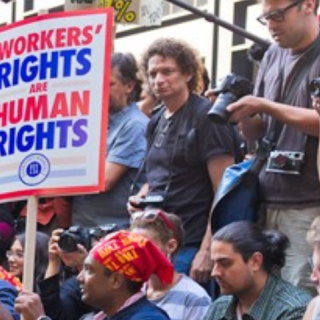Advertisement
There’s no argument about one thing in looking at the results of the off-year elections: Republicans had a very bad day. We can all argue about what that means for the future, but there’s no way not to see this as anything other than an ass-whipping. Democratics won governor races in both New Jersey and Virginia, and they did so by beating the poll predictions by 6 and 10 precent. These were also victories of women candidates over men, which is an accomplishment in and of itself in these dark days. Zohran Mamdani won with a decisive majority over the former governor and longtime political lion of a New York State political dynasty. He is the youngest major there, as well as first Muslim, Southeast Asian, and former resident of Africa. He is also a socialist and will now be the socialist mayor of the largest US city since a socialist was mayor in Milwaukee, Wisconsin. That’s not all. California’s Governor Newsom won his controversial ballot referendum approving the redistricting that will give Democrats an opportunity to pick up five seats in the midterms to counter Trump’s efforts in Texas, North Carolina, and other states. Newsom, as the anti-Trump, didn’t just win on his counter-gerrymander, but won almost 2 to 1.
Pundits are saying the Democrats are still looking for their message for the future, but they may be missing a recurring theme in these victories. Mamdani and the governors’ victories focused on affordability. They are not the only ones. Democrats upset two Republicans on Georgia’s utility board. As the Times reported: The closely watched races for two of the five seats on the Georgia Public Service Commission had been viewed not only as a referendum on rising electric bills but also as a bellwether for next year’s contests for governor and U.S. Senate. Since 2007, no Democrat has served on the commission, whose members have six-year terms. But the two Democratic candidates tapped into anger over rising electric bills at a time when prices have risen sharply across the country.
Over the last two years, the commission has approved six rate increases for Georgia Power, the state’s largest electric provider. Some articles have correctly pointed out that candidates were also running against Trump. Importantly, they note that the vote totals in Virginia and New Jersey for his Republican candidates tracked Trump’s negative polling numbers in these states. Others have pointed out that in these normally lower voter turnouts in off-year elections, Democrats were nearing or exceeding totals for the last presidential election. Running for a better economy is now inevitably running against Trump, since his tariffs, budget, and tax programs are either triggering unaffordability or exacerbating it. It’s still “the economy, stupid,” and unless there’s a major sea change, affordability and the economy will be front and center in the midterm elections one year
from now.
Some conservative columnists are arguing that the Democrats need to move to the middle. Focusing on economic issues and affordability from housing costs to electricity bills has the ability to drown out all of the cultural issues that have been the Republican’s bedrock. Campaigning against feminism, abortion, immigrants, whatever “woke” is, and campaigning for something flimsy and undefined like a nostalgic view of the country might fool some people some of the time about whose interests a party is really fronting, but it won’t fool enough people all of the time. Mamdani is proving, and he’s not alone, that if candidates focus on the economy, voters can overlook a candidate’s religion, ethnicity, immigrant background, and, yes, even their progressive politics, if they promise to cut through the noise and deliver the goods that improve voters’ lives and families, rather than those of the rich and corporations.



